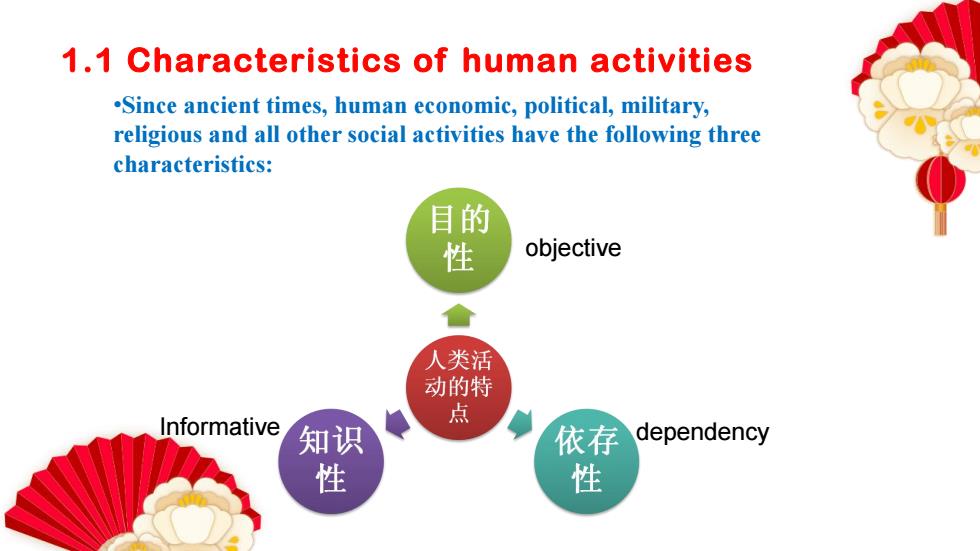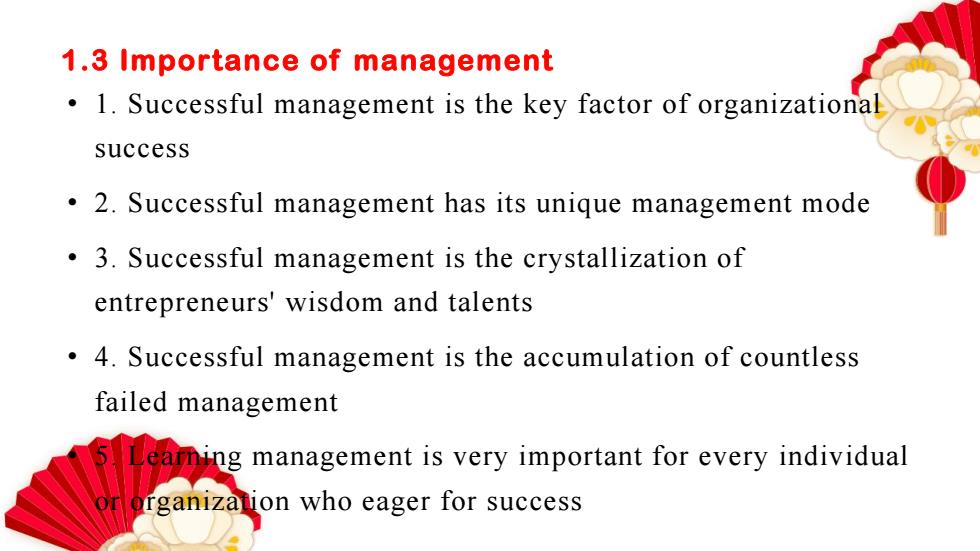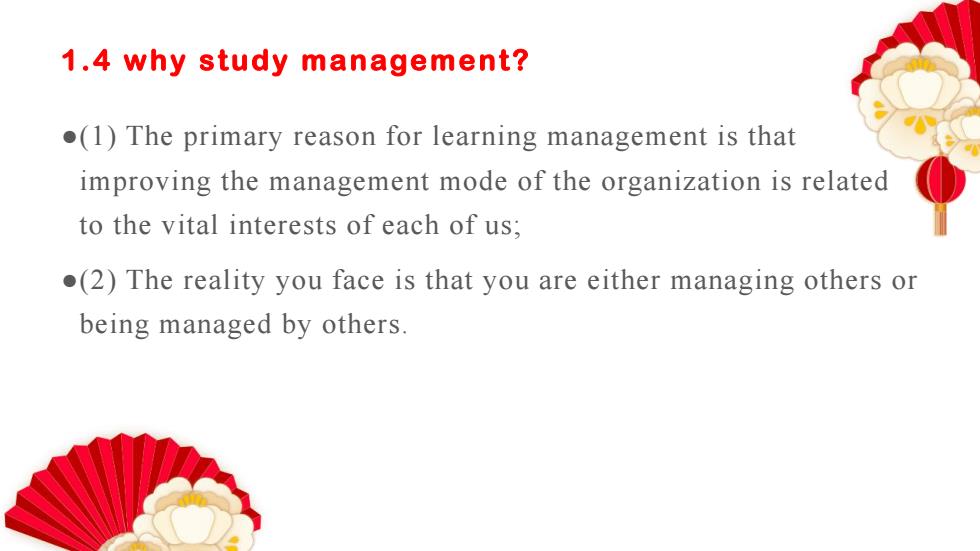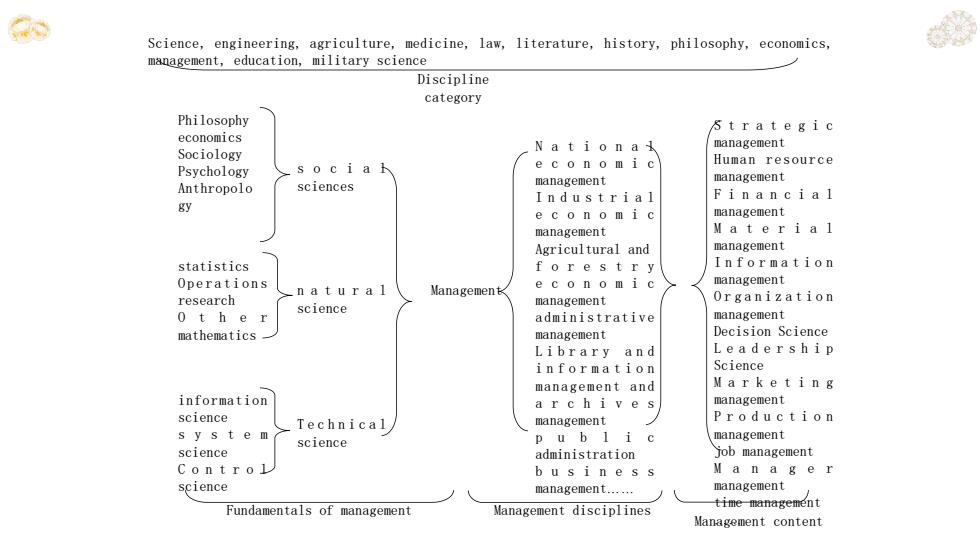
1.1 Characteristics of human activities .Since ancient times,human economic,political,military, religious and all other social activities have the following three characteristics: 目的 性 objective 人类活 动的特 点 Informative 知识 依存 dependency 性 性
•Since ancient times, human economic, political, military, religious and all other social activities have the following three characteristics: 1.1 Characteristics of human activities objective Informative dependency

1.2 Necessity of management The rise and development of management boom After the industrial revolution ·After World War II ·1970s Necessity of learning management ·Resource shortage Backward science and technology Specialized social division of labor The need to condense the strength of all members Development of information technology
• The rise and development of management boom • After the industrial revolution • After World War II • 1970s • Necessity of learning management • Resource shortage • Backward science and technology • Specialized social division of labor • The need to condense the strength of all members • Development of information technology 1.2 Necessity of management

1.3 Importance of management 1.Successful management is the key factor of organizational success 2.Successful management has its unique management mode 3.Successful management is the crystallization of entrepreneurs'wisdom and talents 4.Successful management is the accumulation of countless failed management eaming management is very important for every individual organization who eager for success
• 1. Successful management is the key factor of organizational success • 2. Successful management has its unique management mode • 3. Successful management is the crystallization of entrepreneurs' wisdom and talents • 4. Successful management is the accumulation of countless failed management • 5. Learning management is very important for every individual or organization who eager for success 1.3 Importance of management

1.4 why study management? (1)The primary reason for learning management is that improving the management mode of the organization is related to the vital interests of each of us; (2)The reality you face is that you are either managing others or being managed by others
1.4 why study management? ●(1) The primary reason for learning management is that improving the management mode of the organization is related to the vital interests of each of us; ●(2) The reality you face is that you are either managing others or being managed by others

⊙ Science,engineering,agriculture,medicine,law,literature,history,philosophy,economics, management,education,military science Discipline category Philosophy 5 t r a t e g i c economics Sociology N a t i o n a management Human resource Psychology s o c i a e c o n o m i c management management Anthropolo sciences Ind us t r i a l F i n an c i a l gy e c o n o m i c management management M a t er i a l Agricultural and management statistics f o r e s t r y I n f o r m a t i o n Operations management n a t ur a l Management e c o n o m i c research management Organization science 0t h e r administrative management mathematics management Decision Science Library and Le a ders h i p infor mat ion Science management and M a r k e t i n g information a r c h i v e s management science Technical management Pr o du ct i o n s y st e m science p u b l i c management science administration job management C o n t r o. b u s i n e ss M a n a g e r science management. management Management disciplines time-management Fundamentals of management Management content
Management content Philosophy economics Sociology Psychology Anthropolo gy statistics O p e r a t i o n s research O t h e r mathematics information science s y s t e m science C o n t r o l science s o c i a l sciences n a t u r a l science T e c h n i c a l science Management N a t i o n a l e c o n o m i c management I n d u s t r i a l e c o n o m i c management Agricultural and f o r e s t r y e c o n o m i c management administrative management L i b r a r y a n d i n f o r m a t i o n management and a r c h i v e s management p u b l i c administration b u s i n e s s management. S t r a t e g i c management Human resource management F i n a n c i a l management M a t e r i a l management I n f o r m a t i o n management O r g a n i z a t i o n management Decision Science L e a d e r s h i p Science M a r k e t i n g management P r o d u c t i o n management job management M a n a g e r management time management . Fundamentals of management Management disciplines Science, engineering, agriculture, medicine, law, literature, history, philosophy, economics, management, education, military science Discipline category